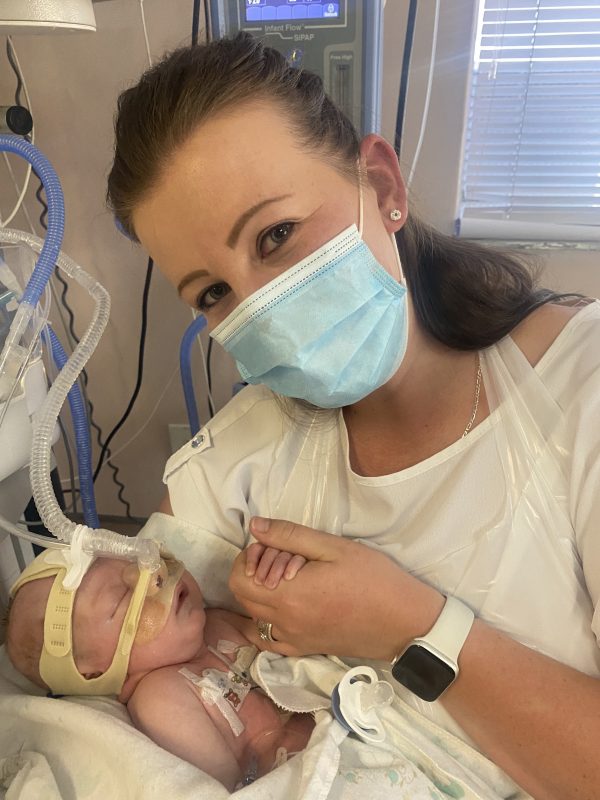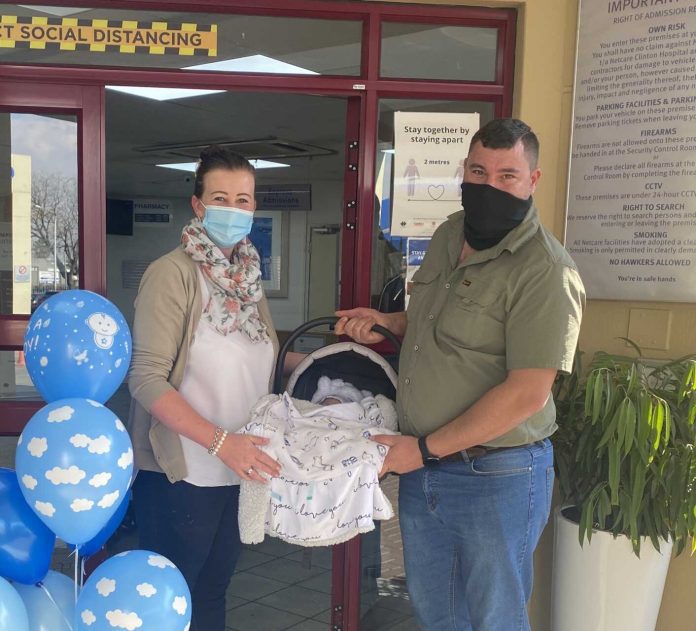Johannesburg – Doctors at Netcare Clinton Hospital in Alberton have described their methods to save the life of a newborn baby as a miracle.
Baby Ignus Greyling was born on 15 April this year with a congenital diaphragmatic hernia [CDH], a large hole in the muscle that separates the chest from the abdomen which caused his abdominal organs to push through the muscle and compress his lungs.
His mother Nadia said it was six weeks, a total of 1 008 long hours before she could hold her baby for the first time.
“We named him Ignus, after my dad. It also means fiery – and this boy is a fighter,” she said.
In a first for South Africa, he was administered Extracorporeal Membrane Oxygenation [ECMO] life support, unheard of for babies this small and surgery that saved his life.
Paediatric pulmonologist Doctor Ashley Jeevarathnum, who suggested the ECMO therapy, said Ignus was discharged on Father’s Day and it was the best gift that the 10 doctors involved could’ve given the parents.
Jeevarathnum explained that the overall chance of survival for Ignus was extremely low, if not non-existent.
“Not only has he survived, but all indications are that he is physically well and neurologically sound. This is an absolute miracle,” he said.
Immediately after his birth Ignus was not breathing and was rushed to the hospital’s neonatal intensive care unit (NICU). He was intubated and put on a ventilator to support his breathing – the first of many lifelines.

Pressures in his lung were exceptionally high, a condition known as pulmonary hypertension, and all life and respiratory support measures had failed. Therapy had to be escalated to extracorporeal membrane oxygenation [ECMO] life support.
Jeevarathnum explained that although ECMO is well established in adult care and is a very good therapeutic strategy, it comes with huge risks for a new born baby.
“ECMO for a neonate with CDH is internationally known to be notoriously difficult, however it was the best option available to support his vital functions and get him well enough for surgery,” said Jeevarathnum
“It was not the fault of the mother in any way. These conditions can be picked during pregnancy, but in this case it wasn’t,” said Jeevarathnum.
ECMO is a highly specialised process where a machine artificially performs the functions of the heart and lungs, 24 hours a day for 12 days, in Ignus’ case.
Nadia said it felt as if someone had pulled the whole world out from under her feet.
“But we were desperate to give Ignus a chance. At one stage I counted eight or nine lifelines connected to his little body, anything from drips, the ECMO machine itself, haemodialysis, a ventilator with nitric oxide and an oscillator. Every move that Dr Ashley made was carefully calculated and discussed with us. My husband was my lifeline – he stayed strong for all of us,” Nadia says.
A senior nurse Zinhle Moyo said they were extremely worried when he turned blue after being born and were concerned as they had never nursed a baby on ECMO in the NICU before.
“It is quite different in real life when you see that little baby connected to that big machine. I learned so much, and with this experience I won’t feel so daunted next time we have a neonate requiring ECMO in our unit,” said Moyo.
Jeevarathnum said after almost two weeks on ECMO, the specialists agreed that Ignus was in a better condition for the surgery to repair the hole in his diaphragm.
“Surgery had to be delayed until baby was stable enough. Rushing it was not the answer. The surgery involved inserting a patch of collagen which would now keep his abdominal organs, including his intestines, liver and spleen, in their correct anatomical position to relieve the pressure on his lungs,” he said.
Paediatric surgeon, Dr Carapinha performed the crucial operation. Other doctors included neonatologist Dr Klaas Mnisi, paediatric intensivist Dr Linda Doedens, paediatric nephrologist Dr Sanushka Naidoo, as well as paediatric cardiothoracic surgeon and ECMO specialist Dr Krubin Naidoo from the Nelson Mandela Children’s Hospital and the paediatric anaesthetic team, Dr Phillipa Penfold and Dean Nolte, who assisted with the anaesthetic during all the delicate surgical procedures.
“Ignus’ story has raised the bar for South African neonatal care, showing that we can reach international standards of medical care for our children and achieve good outcomes even for highly compromised babies,” said Jeevarathnum.
Nadia said, now at 14 weeks he is thriving and although he may never run the comrades, he will have a normal childhood. She also said because he is at risk of respiratory infections still, she was not allowing anyone into her home during the Covid-19 pandemic.
Follow @SundayWorldZA on Twitter and @sundayworldza on Instagram, or like our Facebook Page, Sunday World, by clicking here for the latest breaking news in South Africa. To Subscribe to Sunday World, click here.
Sunday World



